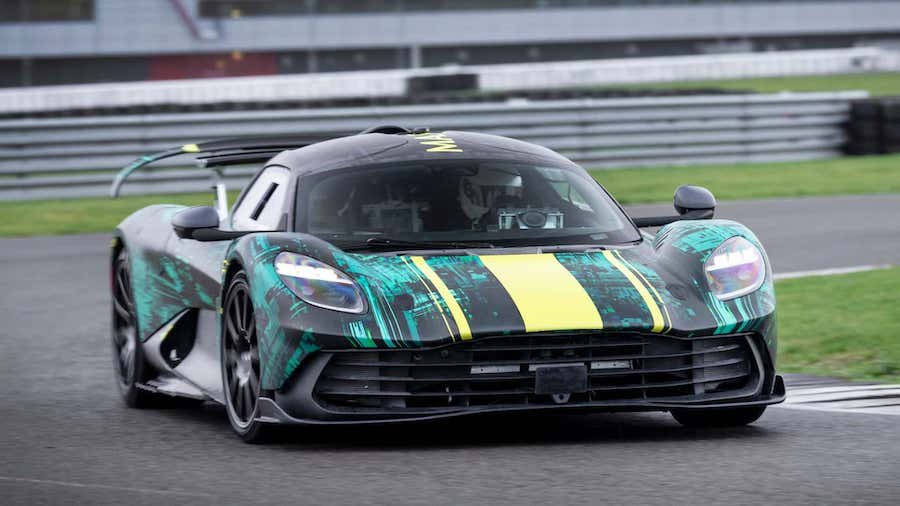2025 Aston Martin Valhalla Hits Silverstone With AMG Twin-Turbo V8 Plug-In Hybrid Muscle

Equipped with racing car-style windows, the prototype isn't shown from the rear, likely because it's a work in progress.
Previewed by a production-intent concept in 2021 with Valkyrie-inspired taillights, the Valhalla switched to a strip of light-emitting diodes out back. The side-view pic further shows a large wing, a massive rear aerodynamic diffuser, a roof-mounted intake, and two more of those on the rear quarters.
Gifted with pop-out exterior door handles, the Valhalla further sweetens the deal with Ford GT-like doors that are part of the roof. Even though you don't have to bend low in order to get in the driver's seat, opening the door in a crowded parking lot or in a parking garage with low clearance will be irksome.
As opposed to the 2021 concept, we also noticed small redesigns of the side skirts and front splitter. Aston Martin didn't bother publishing a video, which is a crime in and of itself due to what powers the Valhalla. With Aston Martin joined at the hip to Mercedes-Benz and Mercedes-AMG, it should come as no surprise that a 4.0-liter V8 of the twin-turbo variety is the powerplant in question. Rather than the M177 twin-turbo eighter of the second-generation GT, this car is rocking the far punchier M178 LS2.
Not to be confused with the 2005 Chevrolet Corvette's naturally aspirated small-block V8, the M178 LS2 refers to the cross-plane crankshaft version of the M178. Said engine saw two applications in the form of the Mercedes-AMG GT Black Series and the GT Track Series. In the latter, it produces 734 ps at 6,700 revolutions per minute and 850 Nm at 2,000 to 6,000 revolutions per minute.
Not enough for an exotic designed with the help of Adrian Newey, but the combustion engine isn't alone. Similar to the Valkyrie, the Valhalla also features hybrid assistance in the form of a plug-in hybrid system that comprises two electric motors for the front axle and one integrated into the transmission.
If that sounds familiar, it's because both Ferrari and Lamborghini offer three-motor PHEVs. The SF90 XX and Lamborghini Revuelto both make in excess of 1,000 mechanical horsepower, with the Fezza packing a twin-turbo V8. The Raging Bull of Sant'Agata Bolognese has the upper hand because of a free-breathing V12 with a displacement of 6.5 liters, a more exotic layout than Ferrari's twin-turbo V8.
The social media post attached below suggests that we're dealing with "a supercar that will set new standards." New standards for breaking promises and waiting times, that's for certain! The Valhalla was originally revealed in the flesh in 2019 as the AM-RB 003, with RB standing for Red Bull.
As for waiting times, Aston Martin has last pushed back the start of production to late 2024, meaning that the first units would arrive at dealers in early 2025. Rated at 1,012 ps (998 hp), the Valhalla is advertised with a top speed of 217 miles per hour (350 kilometers per hour). 62 miles per hour (100 kilometers per hour) should take 2.5 seconds, meaning 2.3 or thereabouts to 60 miles per hour.
